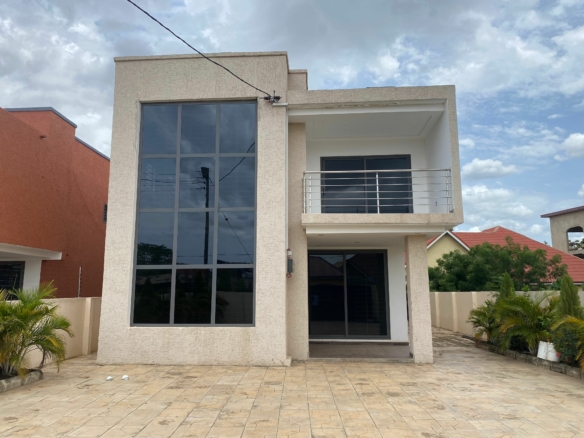Real estate has long been considered a stable and lucrative investment option. But in today’s rapidly evolving market, traditional methods of property valuation and trend forecasting are no longer enough. Enter artificial intelligence (AI) – the game-changing technology that is revolutionising how investors make decisions in Ghana’s dynamic real estate landscape.
The Rise of AI in Real Estate
Artificial intelligence refers to computer systems that can perform tasks that typically require human intelligence, such as visual perception, speech recognition, decision-making, and language translation. In the context of real estate, AI leverages vast amounts of data to uncover patterns, predict trends, and provide actionable insights for investors.
Globally, AI is being harnessed to streamline various aspects of the real estate industry, from property search and valuation to market analysis and investment strategy. According to a report by Grand View Research, the global AI in the real estate market size is expected to reach USD 8.9 billion by 2028, growing at a CAGR of 33.7% from 2021 to 2028. This rapid growth highlights the increasing recognition of AI’s potential to transform the way we invest in property.
AI’s Impact on Real Estate Investment in Ghana
Ghana’s real estate market is no exception to this technological shift. As the country experiences rapid urbanisation, economic growth, and a rising middle class, the demand for housing and commercial properties continues to soar. In this dynamic environment, AI is proving to be a powerful tool for investors seeking to stay ahead of the curve.
Predicting Market Trends
One of the key ways AI is transforming real estate investment in Ghana is through its ability to predict market trends with remarkable accuracy. By analysing vast amounts of historical market data, economic indicators, and demographic trends, AI algorithms can forecast property price fluctuations and demand patterns in major cities like Accra and Kumasi.
For instance, AI-powered platforms can identify correlations between factors such as GDP growth, population density, infrastructure development, and property prices. By processing this complex web of data, AI can provide investors with valuable insights into which regions and property types are likely to appreciate in value over time.
Identifying Emerging Hotspots
In addition to predicting broader market trends, AI can also help investors identify emerging hotspots for real estate investment in Ghana. By analysing data on infrastructure projects, urban planning initiatives, and population migration patterns, AI tools can pinpoint up-and-coming areas that are poised for growth.
For example, an AI algorithm might detect a surge in building permits, new road construction, or plans for a major commercial development in a particular neighbourhood. These insights can alert investors to opportunities in areas that may not yet be on the radar of traditional real estate analysts.
Assessing Investment Risks
Investing in real estate always involves a degree of risk, whether it’s the potential for market oversaturation, economic volatility, or changes in consumer preferences. AI can help mitigate these risks by providing investors with predictive analytics and scenario modelling.
By simulating various market conditions and stress-testing investment portfolios, AI tools can help investors assess the resilience of their assets and make data-driven decisions to optimise returns while minimising risk exposure. This level of sophisticated risk assessment was previously only accessible to institutional investors, but AI is now democratising access to these powerful tools.
The Benefits for Real Estate Investors
The integration of AI into Ghana’s real estate market offers numerous benefits for savvy investors looking to gain a competitive edge.
Enhanced Decision-Making
One of the most significant advantages of using AI for real estate investment is the ability to make more informed, data-driven decisions. Rather than relying solely on intuition or limited market analysis, investors can now access comprehensive, real-time insights to guide their investment strategies.
AI-powered platforms can provide customised investment recommendations based on an investor’s specific goals, risk tolerance, and budget. By leveraging machine learning algorithms, these tools can continuously refine their suggestions as market conditions evolve, ensuring that investors are always making the most opportune moves.
Efficiency and Cost Savings
In addition to improving decision-making, AI also streamlines many of the time-consuming and costly processes involved in real estate investment. Tasks such as property valuation, market research, and due diligence can be automated and optimised through AI, saving investors significant time and resources.
For example, AI-powered valuation tools can quickly analyse comparable properties, adjust for unique features or location-specific factors, and provide accurate estimates of a property’s fair market value. This not only speeds up the investment process but also reduces the risk of overpaying for assets.
Personalised Investment Opportunities
Another key benefit of AI in real estate is the ability to match investors with properties that align with their specific criteria. By leveraging data on an investor’s preferences, budget, and investment horizon, AI-powered platforms can curate personalised listings and alert users to new opportunities as soon as they hit the market.
This level of customisation not only saves investors time in scouring listings but also increases the likelihood of finding properties that meet their unique needs and goals. Whether an investor is looking for a long-term rental property in a specific neighbourhood or a value-add opportunity with high appreciation potential, AI can help identify the most promising options.
Challenges and Future Outlook
While the potential of AI in Ghana’s real estate market is immense, there are still some challenges to widespread adoption. One of the main hurdles is the availability and quality of data. To function effectively, AI algorithms require large, accurate datasets on property transactions, market conditions, and demographic trends. In Ghana, where data collection and management systems are still developing, ensuring a reliable data pipeline can be a challenge.
Another consideration is the need for local market expertise to interpret and act upon AI-generated insights. While AI can provide powerful predictive analytics, it still requires human judgment to contextualise and apply those findings in a way that aligns with an investor’s goals and risk profile. As such, the most successful investors will likely be those who can effectively combine AI tools with on-the-ground knowledge and experience.
Despite these challenges, the future of AI in Ghana’s real estate market looks bright. As more investors recognise the value of data-driven decision-making, the demand for AI-powered tools and platforms is set to grow. Moreover, as technology continues to advance, we can expect even more sophisticated applications of AI in real estate, from virtual property tours and chatbot assistants to fully automated property management systems.
Key Takeaways
- AI is revolutionising real estate investment in Ghana by providing data-driven insights and predictive analytics.
- AI can help investors predict market trends, identify emerging hotspots, and assess investment risks.
- The benefits of using AI for real estate investment include enhanced decision-making, efficiency, cost savings, and personalised investment opportunities.
- Challenges to widespread adoption include data availability and the need for local market expertise to interpret AI insights.
- As technology advances, the future of AI in Ghana’s real estate market looks promising, with potential for even more sophisticated applications.
Frequently Asked Questions
-
What types of data does AI use to predict real estate market trends?
AI algorithms analyse a wide range of data, including historical property prices, economic indicators, demographic trends, infrastructure development, and more to predict market trends.
-
How accurate are AI predictions in real estate?
While no prediction is 100% accurate, AI has shown remarkable success in forecasting market trends and identifying investment opportunities. The accuracy of AI predictions continues to improve as more data becomes available and algorithms become more sophisticated.
-
Can AI replace human judgment in real estate investing?
AI is a powerful tool to augment and inform human decision-making, but it is not a replacement for human judgment. Successful investors will likely be those who can effectively combine AI insights with local market knowledge and experience.
-
Is AI only accessible to large institutional investors?
Not at all! One of the key benefits of AI in real estate is that it democratises access to sophisticated investment tools and analytics. Many AI-powered platforms are designed for individual investors and offer affordable, user-friendly interfaces.
-
How can I get started with using AI for real estate investment in Ghana?
A great place to start is by exploring AI-powered real estate platforms like Ghana Property Finder. These platforms offer a range of tools and resources to help investors make data-driven decisions and find personalised investment opportunities. Be sure to also stay informed about the latest developments in AI and real estate through industry blogs, conferences, and networking with other investors.
As the real estate landscape in Ghana continues to evolve, one thing is clear: AI is no longer a futuristic concept, but a powerful tool that is already transforming the way we invest in property. By harnessing the predictive power of AI, investors can gain a competitive edge, make smarter decisions, and unlock new opportunities in Ghana’s dynamic real estate market.
Ready to start your AI-powered real estate investment journey? Visit Ghana Property Finder today to explore curated listings, access cutting-edge market analytics, and connect with experienced advisors who can help you navigate the exciting world of AI-driven real estate investing in Ghana.






